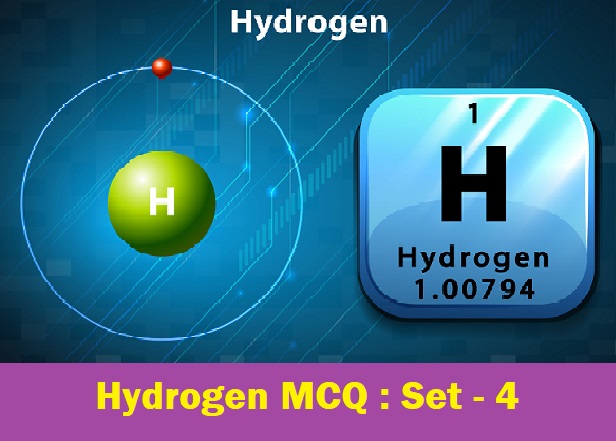CBSE Class 11 Chemistry Chapter 9 Hydrogen Multiple Choice Questions with Answers. MCQ Questions Class 11 Chemistry Hydrogen with Answers was Prepared Based on Latest Exam Pattern. Students can solve NCERT Class 11 Chemistry Hydrogen MCQs with Answers to know their preparation level.
Students who are searching for NCERT MCQ Questions for Class 11 Chemistry Hydrogen with Answers are compiled here to get good practice on all fundamentals. Know your preparation level on MCQ Questions for Class 11 Chemistry with Answers. You can also verify your answers from our provided MCQ Class 11 Chemistry Hydrogen with Answers. So, ace up your preparation with MCQ of Chapter 9 Chemistry Objective Questions.
MCQ Questions Class 11 Chemistry Hydrogen with Answers - Set - 4
Question 1:
Which of the following is not a use of dihydrogen ?
(a) It used in fuel cells for generating electrical energy.
(b) Atomic hydrogen and oxy-hydrogen torches are used for cutting and welding purposes.
(c) It used in the synthesis of hydroquinone and tartaric acid.
(d) Both (b) and (c)
Correct Answer – (C)
Question 2 :
Very pure hydrogen (99.9) can be made by which of the following processes ?
(a) Reaction of methane with steam
(b) Mixing natural hydrocarbons of high molecular weight
(c) Electrolysis of water
(d) Reaction of salts like hydrides with water
Correct Answer – (D)
Question 3 :
Hydrogen is not obtained when zinc reacts with
(a) Cold water
(b) dil. HCl
(c) dil. H2SO4
(d) Hot NaOH (20%)
Correct Answer – (A)
Question 4 :
Why is water gas (mixture of CO and H2) also called ‘syn gas’?
(a) Because it is synthesised from sewage, saw – dust, scrap wood etc.
(b) Because it is synthesised from methane gas
(c) Because it is used in the synthesis of methanol and a number of hydrocarbons.
(d) None of these
Correct Answer – (C)
Question 5 :
Number of neutrons in three isotopes of hydrogen, protium, deuterium and tritium respectively is
(a) 0, 1, 2
(b) 1, 1,1
(c) 2, 1, 0
(d) 2, 0, 1
Correct Answer – (A)
MCQ Questions Class 11 Chemistry Hydrogen with Answers
Question 6 :
Which of the following is formed on reaction of carbon monoxide gas with dihydrogen in presence of cobalt as a catalyst?
(a) Methanal
(b) Methanol
(c) Methane
(d) Formic acid
Correct Answer – (B)
Question 7 :
Which one of the following pairs of substances will not produce hydrogen when reacted together?
(a) Copper and conc. nitric acid
(b) Ethanol and metallic sodium
(c) Magnesium and steam
(d) Phenol and metallic sodium
Correct Answer – (A)
Question 8 :
Which one of the following pairs of substances on reaction will not evolve H2 gas?
(a) Iron and H2SO4 (aqueous)
(b) Iron and steam
(c) Copper and HCl (aqueous)
(d) Sodium and ethyl alcohol
Correct Answer – (C)
Question 9 :
Which isotope(s) of hydrogen is/are radioactive and emits low energy β– particles?
(i) Protium (ii) Tritium
(iii) Deuterium
(a) (i) and (ii)
(b) (iii) only
(c) (ii) only
(d) (ii) and (iii)
Correct Answer – (C)
Question 10 :
In Bosch’s process which gas is utilised for the production of hydrogen gas ?
(a) Producer gas
(b) Water gas
(c) Coal gas
(d) None of these
Correct Answer – (B)
- NCERT Solutions Class 11 Chemistry Chapter 1 : Some Basic Concepts of Chemistry
- NCERT Solutions Class 11 Chemistry Chapter 2 : Structure Of The Atom
- NCERT Solutions Class 11 Chemistry Chapter 3 : Classification of Elements and Periodicity in Properties
- NCERT Solutions Class 11 Chemistry Chapter 4 : Chemical Bonding and Molecular Structure
- NCERT Solutions Class 11 Chemistry Chapter 5 : States of Matter
- NCERT Solutions Class 11 Chemistry Chapter 6 : Thermodynamics
- NCERT Solutions Class 11 Chemistry Chapter 7 : Equilibrium
- NCERT Solutions Class 11 Chemistry Chapter 8 : Redox Reactions
- NCERT Solutions Class 11 Chemistry Chapter 9 : Hydrogen
- NCERT Solutions Class 11 Chemistry Chapter 10 : The s-Block Elements
- NCERT Solutions Class 11 Chemistry Chapter 11 : The p-Block Elements
- NCERT Solutions Class 11 Chemistry Chapter 12 : Organic Chemistry: Some Basic Principles and Techniques
- NCERT Solutions Class 11 Chemistry Chapter 13 : Hydrocarbons
- NCERT Solutions Class 11 Chemistry Chapter 14 : Environmental Chemistry



